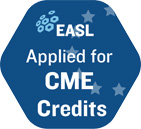Course directors
- Prof. Jonel Trebicka, Germany
- Prof. Stefan Zeuzem, Germany
Programme Overview/Summary
This clinical school includes six large complexes relating to the management of acute-on-chronic liver failure (ACLF):
- predisposing and precipitating factors
- etiological treatment
- nutrition and hepatic encephalopathy
- infections
- management of organ failure, and
- liver transplantation.
Learning objectives
- Learn the EASL-definitions and recommendations for the diagnosis and management of ACLF
- Strengthen the implementation of the EASL-guidelines in Europe
CME accreditation
The EASL School of Hepatology – Management of acute-on-chronic liver failure, Frankfurt, Germany, 03/09/2021-04/09/2021 has been accredited by the European Accreditation Council for Continuing Medical Education (EACCME®) with 12 European CME credits (ECMEC®s). Each medical specialist should claim only those hours of credit that he/she actually spent in the educational activity.
Through an agreement between the Union Européenne des Médecins Spécialistes and the American Medical Association, physicians may convert EACCME® credits to an equivalent number of AMA PRA Category 1 CreditsTM. Information on the process to convert EACCME® credit to AMA credit can be found at www.ama-assn.org/education/earn-credit-participation-international-activities.
Live educational activities, occurring outside of Canada, recognised by the UEMS-ACCME® for ECMEC®s are deemed to be Accredited Group Learning Activities (Section 1) as defined by the Maintenance of Certification Program of the Royal College of Physicians and Surgeons of Canada.
Description
The University Clinic Frankfurt offers considerable expertise and is ideally situated to cover these topics and to contribute to teaching of younger clinician-scientists coordinated by EASL. Because the Department of Internal Medicine I, University Clinic Frankfurt is very experienced in organising and hosting preceptorships, it has the ideal infrastructure and staff to host this EASL clinical school of hepatology. Moreover, this course will provide hand-on sessions on: Echography/Elastography (by Prof. Mireen Friedrich-Rust), ICU-management in skills lab (by Prof. Jörg Bojunga), TIPS live cases (by Prof. Jonel Trebicka), and HE-assessment (by Prof. Harald Farnik).
Prof. Joel Trebicka, faculty member of EASL-Clinical Practice Guidelines on Complications of Cirrhosis and responsible for the section on ACLF, will present the predisposing factors for the development of ACLF. His expertise lies in decompensated cirrhosis and portal hypertension-related complications. Additionally, he is faculty member of Baveno VI and VII, coordinator of the German GI-bleeding guidelines, and work group leader in the German complications of cirrhosis guidelines.
Prof. Stefan Zeuzem is one of the leading world experts in HCV treatment as an important etiological factor of cirrhosis. With considerable expertise in the field of viral hepatitis and longstanding clinical experience as head of department, he will present the role of etiological treatment in ACLF patients.
Prof. Mathias Plauth, a world-leading nutritional expert, has contributed to both the EASL and German guidelines on nutrition and hepatic encephalopathy.
Prof. Oliver Waidmann is a motivated younger colleague with research interests in infection and multidrug-resistant bacteria in ACLF.
Prof. Jörg Bojunga, an experienced intensivist and head of the medical ICU, presents the management of organ failures and artificial organ support in ACLF.
Prof. Wolf Bechstein, head of the transplantation surgery and coordinator of the German liver transplantation guidelines, is well placed to present the younger attending colleagues with the still debated role of liver transplantation in ACLF and to guide them through it.
Prof. Mireen Friedrich-Rust, a leading echographist and experienced clinician in elastographic methods, will teach and guide participants on the different modalities of echographic and elastographic methods to guide decision-making.
For participants interested in translational research, Dr Robert Schierwagen (biologist by training) and Dr Frank Uschner (clinician-scientist) will guide them in this field from the planning of the study, through the sampling and biobanking of different biological materials, to basic techniques used in the detection of biomarkers. Both colleagues have been significantly engaged in the planning and execution of different large studies such as PREDICT (NCT03056612), NEPTUN (NCT03628807), and others (NCT03072615, NCT03584204, NCT03083925).
Finally, the state-of-the-art lecture will be held by Prof. Paolo Angeli, Editor-in-Chief of the Journal of Hepatology, former chair of the International Ascites Club, chair of the EASL-Clinical Practice Guidelines on Complications of Cirrhosis, and chair of the EASL-CLIF Consortium. He is ideally placed to present the topic of the management of ACLF.
About EASL Schools
The schools contribute to the training of new generations of hepatologists and are a major element of our association. Aimed at young fellows enrolled in hepatology-oriented departments or more experienced clinicians who want to be exposed to the newest trends in hepatology.
For selected applicants, EASL will cover transportation costs to attend the school and accommodation during the event (details will be provided individually once the selection process has been done).
Application is open to young fellows under the age of 35 (born after 17 September 1987) and/or still in training.
Approximately 30 places are available for each school and only EASL members are allowed to apply. Become an EASL member
Questions about EASL Schools?
Education is a priority for EASL and the association provides educational opportunities at every level. Traditionally, EASL Schools have been held in person, face to face. As the COVID-19 pandemic evolves, EASL may adapt to holding Schools online.
Due to strong interest in the EASL Schools, we have decided to give everyone additional time to complete and submit their applications. The new deadline is 23 February 2021. Please make sure your EASL membership is active before you submit your application.
Please make sure your EASL membership is active before submitting your application. Become an EASL member.
Please address your questions to schools@easloffice.eu and consult the Travel and attendance guidelines for EASL events
EASL Schools
See the entire offer and find out more on EASL Schools.


